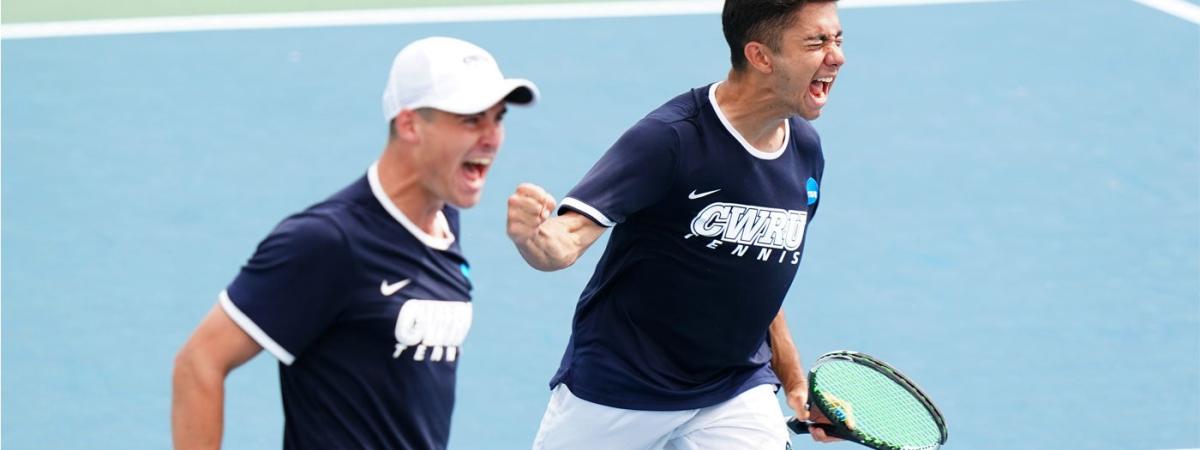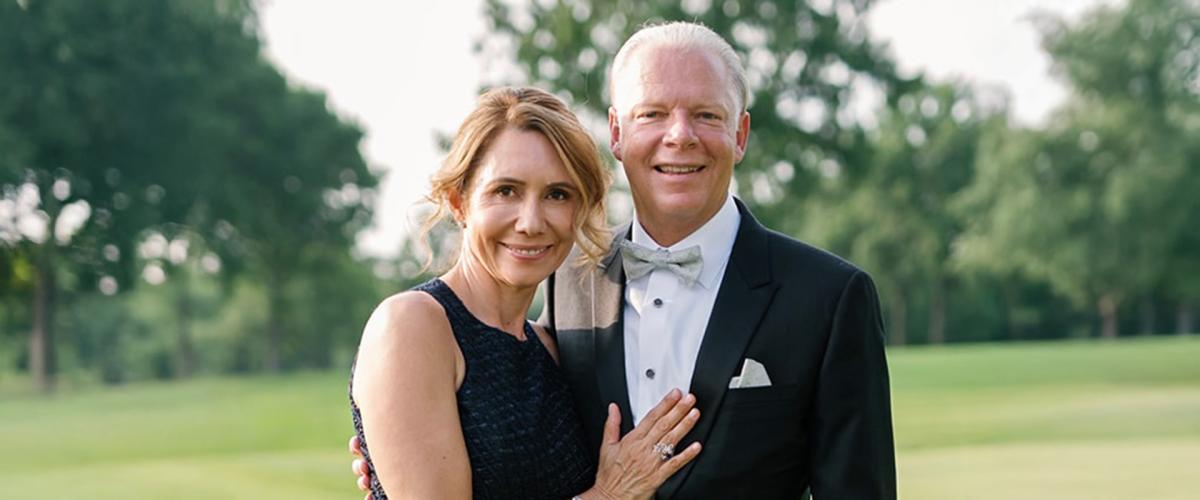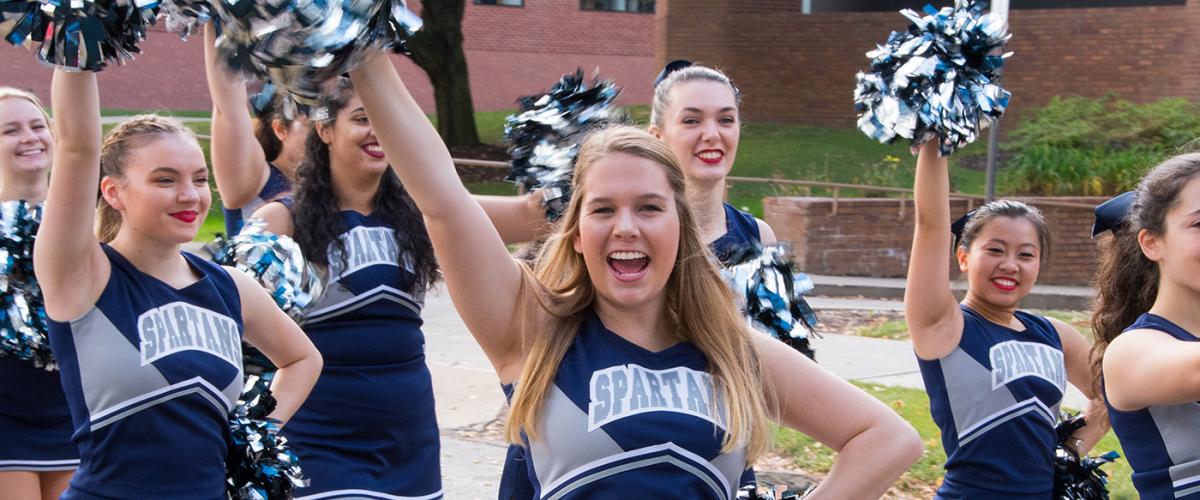Both Jonathan Powell and James Hopper readily admit their collegiate tennis prospects weren’t the strongest.
“There were very few coaches who were truly interested in recruiting me,” said Hopper, now a rising senior majoring in biomedical engineering who grew up playing soccer and didn’t get serious about tennis until high school.
Powell, who had been playing tennis since age 5, had a similar experience.
“Coming out of high school I wasn't a very strong recruit like [James] was saying about himself except I was even weaker, so as you can imagine, even less college coaches were talking to me than him,” said Powell, a graduate student earning his Master of Business Analytics & Intelligence.
But they both found a home here at Case Western Reserve on a team led by Head Coach Todd Wojtkowski. And just last weekend, they proved themselves on the court, taking home the 2022 NCAA Division III Doubles Championship in Orlando by beating Emory University’s Andrew Esses and Nolan Shah in straight sets, 6-4, 6-1.
Their win solidified their spots in Spartan history—becoming CWRU’s second doubles team to win the NCAA Championship, after Eric Klawitter and CJ Krimbill won in 2014, and the 16th and 17th NCAA champions in school history.
Their win followed a disappointing team loss to University of Chicago in the finals, resulting in a second-straight finish as the NCAA Division III runner-up.
What did the road to the national championship look like for the pair? We sat down with Hopper and Powell to discuss their historic season. Read more about their win.
Answers have been edited for clarity and length.
How would you describe your dynamic on the court?
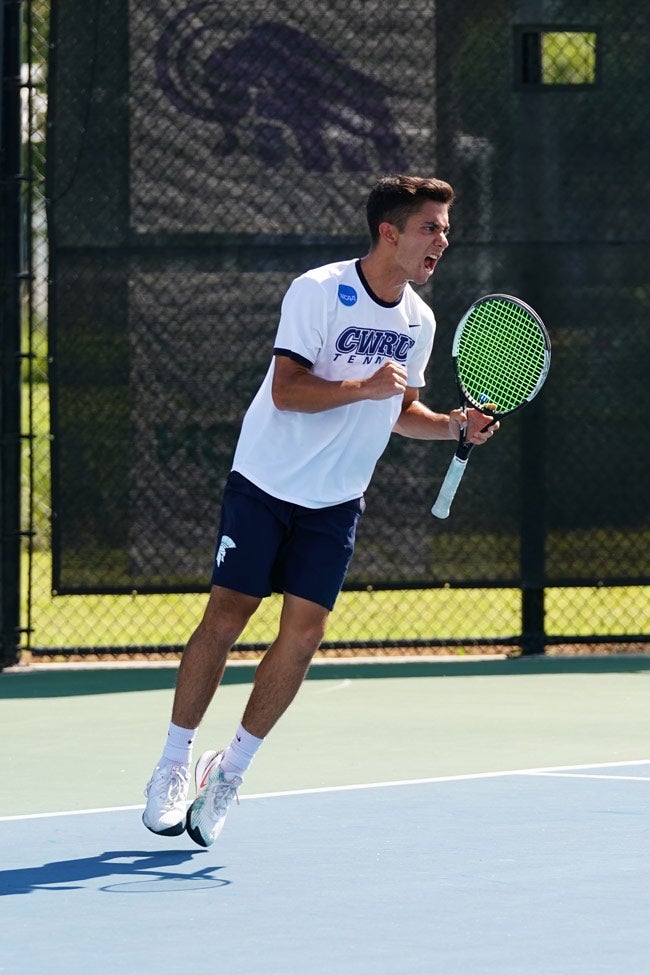
Photo credit: Manuela Davies/USTA
Jonathan Powell: The first two years of [James] being on the team, our coach seemed to really want to put us together as a doubles team, but we just didn't have chemistry at all. We just didn't really understand how the other person was moving, we didn't understand where they wanted to put the ball on the court. There just was a complete mismatch of two guys who love to play doubles.
This year, or maybe was the end of last year, things started to really click for us, and we started to trust each other on the court and be able to cover the right spots and understand each other's strengths and weaknesses in order to play well together. A lot of our on-court strategy is I’m going to set him up, I'm going to keep the rally going for as long as I can, and play fundamental doubles and [James is] going to use his size and his power to put the ball away, and play physical tennis the way he knows how. He's the athletic one, and I can support his athleticism from the side.
James Hopper: It took a lot of reps in practice, getting through reps in matches, even if it didn’t work out great in some instances. Sticking with it and knowing eventually it was going to work out, we were going to figure things out.
At what point during the season did you know this was going to be something special?
Hopper: We've known for at least the past couple years that this had been building up for our whole team. We'd really had a strong group of guys on the team who have all been working super hard throughout the years to achieve a season like this. This year, I wouldn't say that there was a specific moment that we felt this. [It was] more like everyday [in] practice, just the way that the guys have been working, how much they love it, how much we've all been chasing toward the same goal of winning a national championship.
Powell: This was my fifth year—my grad year—but I remember as an underclassman, showing up to the regional tournament in the fall, we used to not have anybody make it to the final day to the championship and semifinal day. But this year, we had three semifinalists … so [now] having that dominating presence in a key tournament in one of the toughest regionals and in the nation … that accomplishment really just shows how hard we've been working and shows our strength in both singles and doubles.
How did you prepare for the tournament?
Powell: A lot of preparing for this tournament involved making sure our bodies were in shape for the Florida heat, so figuring out the highs of each day in terms of temperature in Cleveland and just getting our training hours in then to acclimate a little bit [and] making sure that we were in shape by doing bike workouts, sprinting workouts, rowing workouts. We even hopped in a hot yoga studio a couple of times throughout the spring, which also was a huge help.
Hopper: Another thing was just staying super motivated and working super hard. It could have been tough after final [exams] ended. We had a couple weeks to spare. It could have been easy to just hang out and have a good time.
As you were competing in that championship match, what was going through your mind? And what was the feeling when you finally won?
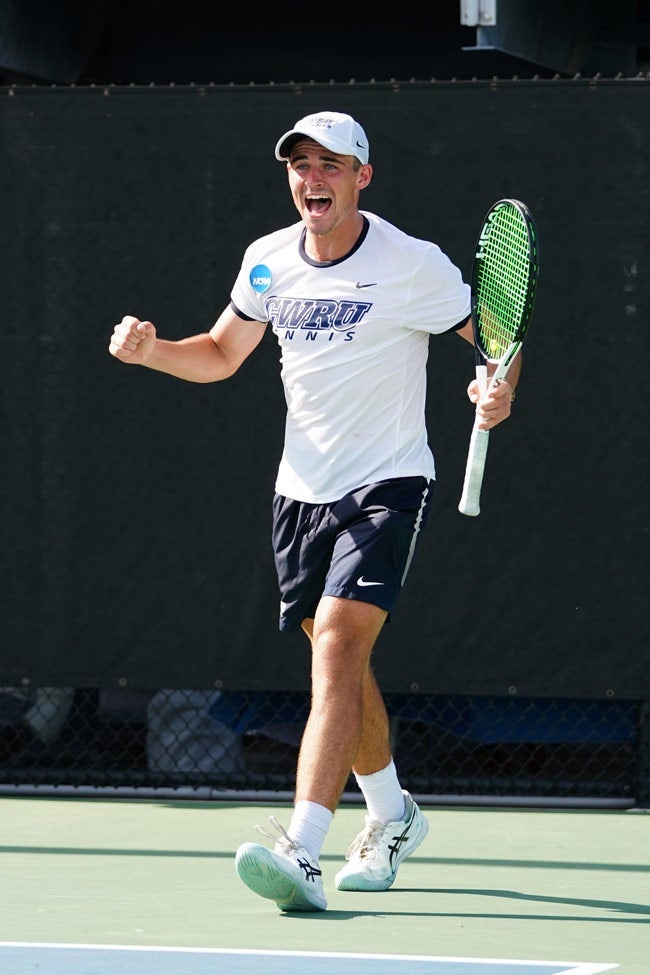
Photo credit: Manuela Davies/USTA
Hopper: [It was] surreal when we won the whole thing. For me, it really didn't sink in until a couple hours later, when everybody's texting you and you're seeing it posted everywhere; it really hadn't sunk in like directly after the match.
The morning of, it honestly didn't feel like a national championship final to me. It was just like another match against two teams that we knew well. The Mary Washington team that we played in semis, I'd played against them last year in the same tournament so we felt pretty familiar with their games. And the Emory team, we'd played them earlier in the year, so we felt like we had a pretty good understanding of what they were going to do. We knew that we just had to go out there and play good doubles and play together well, and if we did that, then we're going to be successful. And that's how it ended up going.
Powell: Going back to that team championship, it was definitely tough—the second year in a row not getting the job done, making it all the way to the finals and coming out holding the second-place trophy. So this was just another great opportunity and, really, my last to do something great with tennis and obviously with [James]. Each day, it was going through my mind that this could be my last collegiate tennis match in a Case Western [Reserve] uniform. Really just enjoying every moment [was a] recurring theme throughout the team event and throughout the double’s event. Me and [James], we always feel like we play our best tennis when we're having fun out there, and that's something we kept mentioning to each other.
What did it mean to you to be the university's first tennis champions since 2014 and to be in a select group of Case Western Reserve athletes with that title?
Powell: We've gotten to know [CJ Krimbill and Eric Klawitter] pretty well. CJ has been helping out as an assistant this year. We know of him as this Case [Western Reserve] legend. You see his name at the courts on like half of the boards for all of his accomplishments, so to be in the same category as him in terms of that accomplishment means a ton to me.
It's something that I will obviously never forget. I finally was able to put my name in Case Western [Reserve] tennis history. It means the absolute world to me to have the title and to finally be a national champion—that’s something that can't be taken away from you.
Hopper: Getting to the NCAA finals in back-to-back years and losing with the team is pretty rough, so to be able to actually win an NCAA championship—not only does it feel great for both of us, but I also feel like it's a great achievement for all of the guys because they they've done just as much as we have for this championship. Even if it's an individual championship, they push us every day, they're alongside us fighting every day, so this one also goes to them for all the hard work that we've been putting in as a program together.


